Tag : Maya Bernstein
December 15, 2011 by Maya Bernstein
Shine
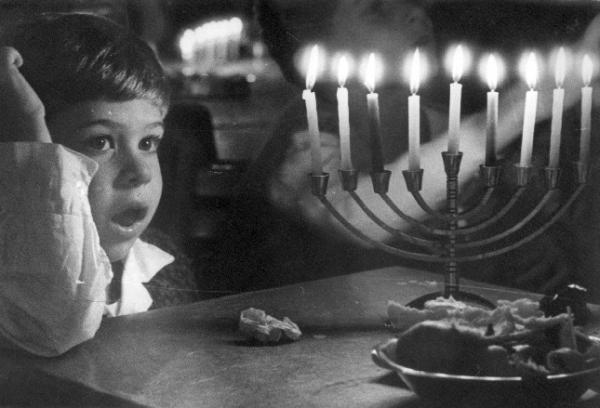
Hashomer Hatzair Archives Yad Yaari
My oldest daughter recently performed in her kindergarten’s annual Thanksgiving Extravaganza. What is it about watching your kid in a school performance that turns a parent into dripping, slobbering mush? There is something so visceral about seeing your kid “up there,” shirt tucked in, braids in place, belting out songs and moving like a turkey and reciting her two lines. As the child stands there, hands stiff at her side, telling the i-phoned face audience of grandparents and parents and siblings, “our next song is ‘Run Turkey Run,’” the parent has a moment of meaning and purpose. I have made a difference in the world. My child is doing something; she is active, she is a participant, she is a contributor. It is invaluable to see your child represent something greater than herself, participate in creating meaning with others, and share that meaning with her world. That is where children shine, and that, in turn, re-connects their parents to what is valuable and important in their lives.
The winter holiday season is upon us, and it is an opportunity to shine. Chanukah, probably the most celebrated and public of all Jewish holidays, has two core components to its celebration. The first is lighting Chanukah candles, one candle on the first night, two on the second, three on the third, increasing the light and the candles until eight burn bright on the last night. The second, as important as the first, is publicizing the celebration of the holiday. That is why it is customary to light candles in the windows or doorframes, so that passer-bys can see, and say, “Look! The lights of Chanukah!” As we remind ourselves as a Jewish community of our story of survival, we share that story with others.
- 1 Comment
December 4, 2011 by Maya Bernstein
Farmer’s Market
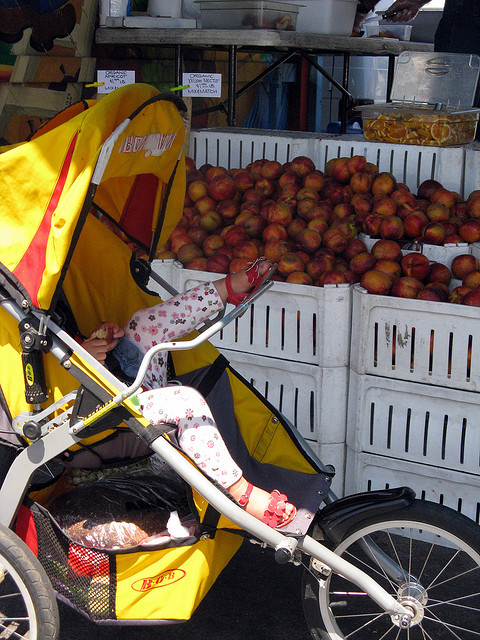
http://www.flickr.com/pollyann
It happened, and then it was over.
There was nothing much to talk about, and I have mostly forgotten the details. The images are somehow fuzzy, remembered in strange slow motion, as if I am still distracted, surprised that I am in the center of the memory, rather than standing on the side, looking in.
It was a cloudy gray Sunday, late morning. I was in my Super-Mom role; my husband was at the library drinking coffee and reading educational philosophy (on Sundays, he assumes his Super-PhD-Man role), and I was in the park, with our three kids, and my cousin’s two daughters. When my cousin dropped off his girls, his nine year old ran off with my three year old, who promptly fell and skinned her knee and started crying; his seven year old ran off with my six year old, who fell off her scooter and started crying; and the baby started screaming for the swing. My cousin gave me a look. I smiled my Super-Mom smile, answering his unspoken ‘are you sure you can handle this’ question, told my girls to tough it out, and carried the baby over to the swing. And I was fine, and so were the kids, as long as I didn’t think too much about what could happen. I let the girls climb and swing high and jump off and pushed the “what-ifs” aside, because otherwise my husband couldn’t ever work on his PhD, and my cousin’s kids couldn’t slip seamlessly into our family, and that wasn’t the family I wanted.
- 4 Comments
November 2, 2011 by Maya Bernstein
Business Trip
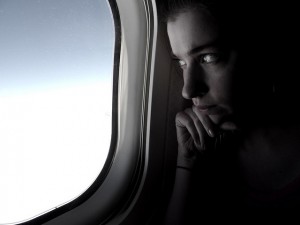
http://www.flickr.com/1flatworld
Six years ago it was evening, and the light came gently through the slats of the hospital window shades, and the room was strangely calm, and it was all so new, and then she was in my arms, a being of radical energy, and I sang to her. Today it was morning of breakfasts and lunches and searching for car keys and rushing and phone calls and singing and dancing of birthday and presents and then of my leaving. Now daytime is flying beneath me is desert before me is evening of working and teaching and she is behind me.
She cried while I applied eye makeup and when I left to catch my flight.
I pinky-promised that I’d try never to travel on her birthday again, but as I sit here tumbling away, I know that this promise didn’t console her. And I know that no matter what I decide or decides me in the future, there will be times when I am not there when she needs me, when she is going in one direction and I in another, when I cannot give her what she needs when she needs it.
As the distance between us grows, in time, in space, I realize that I must learn how to better help her navigate the distances that inevitably arise. Perhaps this is my most important job as her mother.
Today, six years later, I learned something. I write it, share it, so as to attempt to better etch it into my own being, with the hope that it may help me diminish the future distances.
- 2 Comments
October 17, 2011 by Maya Bernstein
The Train: New Poetry
Each week, I travel to and from work by train. My children cling to my legs and wave their arms and shout farewells, as I board my bike and pedal towards the train station, feeling a tight-throated yearning for their sweet presence, and a gravitational pull towards freedom, possibility, self. The train has become a powerful metaphor for my life. As soon as I board, I am acutely aware that I have made a decision and put myself in motion, and then, of a sudden, am not in control, am barreling toward a destination, watching the world beyond the window, wondering. It has become a space of poetry, a liminal space of possibility, and, in its own way, a space of prayer. Below are two poems I wrote during the month of Ellul and the period of the High Holy Days.
- No Comments
July 5, 2011 by Maya Bernstein
Failing Forward
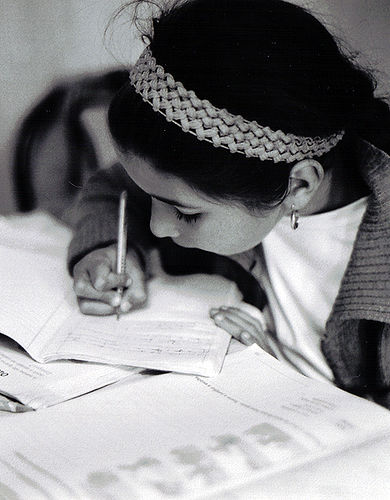 My daughter, in a post-kindergarten exuberant high, has been exercising her new reading and writing skills by creating “books” in her free time. She wrote one called “Zoo.” It was four computer-paper pages long, taped together. Page one had a picture of a horse, and, underneath, the word “horse.” Page two had a zebra, “zebra.” Page three a whale, “whale.”
My daughter, in a post-kindergarten exuberant high, has been exercising her new reading and writing skills by creating “books” in her free time. She wrote one called “Zoo.” It was four computer-paper pages long, taped together. Page one had a picture of a horse, and, underneath, the word “horse.” Page two had a zebra, “zebra.” Page three a whale, “whale.”
Her next book showed remarkable progress. She titled it “The Magical Book,” and, in a nod to Magritte, flatly and surreally described her drawings. Page one pictures a magic wand and the words: “This is a wand.” Page two has a prancing unicorn and the description: “This is a unicorn,” and so on. Had she merely inserted the word “not,” her artwork would be hanging beside the famous pipe and hotly debated in bars nationwide.
I noticed a circle, outlined in black, colored in with a yellow highlighter, on the title page, and asked what it was. She smiled and said, “That’s the golden medal that great books get. I gave one to my book.” And so, I find myself in the wonderful position of being the parent of a Caldecott Medalist.
I was struck by her audacity. Of course, she didn’t realize it, but she was embracing advice given by conductor Benjamin Zander, conductor of the Boston Philharmonic, in his book “The Art of Possibility.” Zander, in an attempt to diffuse the extreme tension around grades in his New England Conservatory of Music class, began his classes by giving each student an “A.” The only requirement he gave them was that, at the end of the semester, they write him a letter explaining why they deserved that “A.” It removed the competition from amongst the students, took the focus away from grades and performance, and challenged students to function like “A” students throughout the semester, taking risks, pushing themselves, and dedicating themselves completely to learning and growing in the class.
That fluorescent yellow circle made me pause. What would happen if we gave our children the “A,” stamped them with medals, before they had done anything, and then challenged them to live up to it? Perhaps it would help them realize that our opinion of them did not depend on their performance? That the most nourishing rewards they can receive are internal? Best of all, might it help them fail forward – become more resilient as they inevitably fall, and realize that each time they do not succeed they can learn something, which will help them grow.
Perhaps we can even go so far as giving ourselves the “A,” as parents, and giving ourselves permission to take risks, to make mistakes, to fail forward as we raise these bright new lives, inevitably tripping along the way? I’m thinking of designing a button, and wearing it with pride at all times. Yes, I will make the wrong choices for my children. Yes, I will lose my cool. Yes, I will say the wrong things at the right times and the right things at the wrong times and pay for their first four years of therapy. But I’ll be wearing my medal. Which means that I’ll have tried my hardest. And I’ll strive not to repeat the same mistakes twice. And I’ll try not to take myself too seriously. And I’ll expect the best of myself at every moment, because I’m wearing that button, I’m a Caldecott Mom.
And then, finally, maybe we’ll be ready to abandon the stamps and the medals and the buttons and the grades altogether, and simply be, like my daughter whose Caldecott book is totally yesterday’s news (today she’s working on a story about a rainbow), striving always to grow, to be our best selves, and, each day, begin anew.
- No Comments
May 31, 2011 by Maya Bernstein
Coda
 Our family had returned from Israel. We had, eventually, embraced the mid-trip loss of our camera. We drew sketches of the special places we had been. We laughed and then sighed, without attempting to re-enact and re-capture the laughter for the camera. We returned home without pictures. We had moved on.
Our family had returned from Israel. We had, eventually, embraced the mid-trip loss of our camera. We drew sketches of the special places we had been. We laughed and then sighed, without attempting to re-enact and re-capture the laughter for the camera. We returned home without pictures. We had moved on.
And then we got the email. Our sister-in-law, who lives in Jerusalem, sent it, and included the whole chain of correspondence, originating with a random Israeli guy who was walking the streets of the Old City and had found our camera. He picked it up, flipped through the pictures, realized the camera must belong to a family on a trip, downloaded one of the pictures, and sent an email to his entire contact list, saying: “Sucks to lose a camera on a family trip. Does anyone recognize these guys?” His huge list of contacts forwarded it on to their huge list of contacts, and, in the fourth iteration, someone recognized my brother-in-law, and sent him an email, saying: “Hey, did you lose your camera in the old city?”
That is how it came to be that we have all of the pictures we took during the first week of our trip to Israel, and how it is that our camera, including the five-shekel piece my three-year-old had asked me to put in the front pocket of the camera case for safe-keeping, are en route across the world, heading home.
At first I was exuberant, lauding the positive uses of social media and a wide web of online “friendships,” joyously sharing the story as a model of the power of the kindness of strangers, the goodness of human nature, the beauty of the people of Israel. I downloaded the pictures with disbelief, sending them to friends and family, acknowledging the truth – I had accepted these were gone, but I am so happy to have them back!
But now I await the camera with breathless suspicion. Can it be that something you have accepted as gone, no longer part of your world, no longer a piece of your reality, can somehow resurface, intact? (more…)
- No Comments
April 21, 2011 by Maya Bernstein
Commemorating
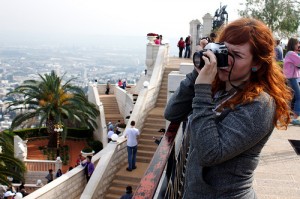 It was one week into my family’s trip to Israel, and we lost our camera. Perhaps it was stolen. Most likely it fell out of the bottom of the stroller, while I was digging for sunscreen, or pretzels, or a hat. Perhaps it was the inevitable sacrifice, to appease the gods who watch over those who travel with young children and worry about losing BPA-free bottles and spoons, favorite dolls’ clothing, socks, diaper-bags, not to mention, of course, the children themselves. I noticed the camera was gone when the children were bathed and clean and dressed for the Sabbath. The girls had flower head-bands in their hair and the baby was wearing a vest, the sun was setting over the walls of the old city in Jerusalem, and the air smelled of the exhaust fumes of the last Friday buses, and of jasmine.
It was one week into my family’s trip to Israel, and we lost our camera. Perhaps it was stolen. Most likely it fell out of the bottom of the stroller, while I was digging for sunscreen, or pretzels, or a hat. Perhaps it was the inevitable sacrifice, to appease the gods who watch over those who travel with young children and worry about losing BPA-free bottles and spoons, favorite dolls’ clothing, socks, diaper-bags, not to mention, of course, the children themselves. I noticed the camera was gone when the children were bathed and clean and dressed for the Sabbath. The girls had flower head-bands in their hair and the baby was wearing a vest, the sun was setting over the walls of the old city in Jerusalem, and the air smelled of the exhaust fumes of the last Friday buses, and of jasmine.
What upset me most was losing a week’s worth of pictures. My oldest moaned: “now it’s like we were never here.” I momentarily entertained the thought of buying a new camera, and retracing our steps. My husband suggested that we could leave pages of our photo-album blank; a trip of blind images, wisps of memories trickling ephemeral from between our fingers.
Now, though, that it is Passover, and the leavened excesses of our existence have been burned, for the moment, and, as a people, we are immersed in the preservation of an ancient psychic memory, the loss seems strangely appropriate. It has reminded me to spend some time experiencing, rather than preserving an experience. I have become so accustomed to reflecting while living, that, perhaps, I have cheated myself out of the full joy of being, of living, without trying to figure out how to package, market, preserve that life. My camera, Twitter account, Facebook site, all at once seem like chametz, bloated with self, replete with very me. How appropriate to be without a camera on Passover, to travel, suddenly, lighter, with a different lens. Emptying myself of these vehicles for expression, I find more space to be. I am reminded of a poem by Sir Thomas Browne: (more…)
- 7 Comments
March 1, 2011 by Maya Bernstein
Witch
When my grandmother babysat for us when I was young, we always played “Witch.” This was a glorified version of Hide and Seek, in which the witch hunted for the innocent children with the hope of capturing and cooking them in her cauldron for supper. My grandmother was the witch, of course, since, hands down, she had the best cackle, and since she had invented the game. We hid (I remember the soft feel of the velour on the back of the chair in the corner of my parent’s bedroom), and she walked around the hallways, cackling and talking in her witch voice, threatening to find us. I don’t remember if she actually found us, or if we simply emerged, terrified, but she appeased us with pots of spaghetti and slices of mozzarella cheese. She’d sing us to sleep in her low alto, and laugh that she was a terrible babysitter, and that we weren’t allowed to repeat anything she said to our parents.
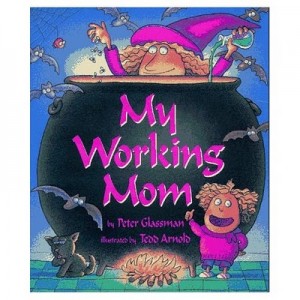 Memories of playing Witch with my grandmother came flooding back at me when I opened last week’s New Yorker magazine to Tina Fey’s article about the challenges of being a working mother. Fey’s daughter comes home from preschool one day with a book with a witch on the cover called “My Working Mom.” Though her daughter is pre-literate, Fey reads into this – my mother the witch who voluntarily goes to work – unleashing her relentless, unforgiving internal debate about whether or not she should take a break from her thriving career to have a second baby. On the one hand, she argues: “And what’s so great about work, anyway? Work won’t visit you when you’re old. Work won’t drive you to the radiologist’s for a mammogram and take you out afterward for soup.” On the other, in addition to the fact that many people depend on her for their jobs, she is also breaking through glass ceilings in comedy, an industry still dominated by (sexist) men, which is why, she writes, “I can’t possibly take time off for a second baby, unless I do, in which case that is nobody’s business and I’ll never regret it for a moment unless it ruins my life.” (more…)
Memories of playing Witch with my grandmother came flooding back at me when I opened last week’s New Yorker magazine to Tina Fey’s article about the challenges of being a working mother. Fey’s daughter comes home from preschool one day with a book with a witch on the cover called “My Working Mom.” Though her daughter is pre-literate, Fey reads into this – my mother the witch who voluntarily goes to work – unleashing her relentless, unforgiving internal debate about whether or not she should take a break from her thriving career to have a second baby. On the one hand, she argues: “And what’s so great about work, anyway? Work won’t visit you when you’re old. Work won’t drive you to the radiologist’s for a mammogram and take you out afterward for soup.” On the other, in addition to the fact that many people depend on her for their jobs, she is also breaking through glass ceilings in comedy, an industry still dominated by (sexist) men, which is why, she writes, “I can’t possibly take time off for a second baby, unless I do, in which case that is nobody’s business and I’ll never regret it for a moment unless it ruins my life.” (more…)
- No Comments
January 3, 2011 by Maya Bernstein
Puppy Love
 I’ve fallen for a dog named Duncan. He is the new love of my life. He has long black hair, and is the size of a large boot. He’s not a smiley dog – he’s quite serious, but can you expect anything else from a working dog? He makes good money, too. And he seems to have a strange habit of not walking upstairs, but being carried, while caressed, sweet nothings (in the form of the word “seek”) being whispered in his ear. I think I can handle that.
I’ve fallen for a dog named Duncan. He is the new love of my life. He has long black hair, and is the size of a large boot. He’s not a smiley dog – he’s quite serious, but can you expect anything else from a working dog? He makes good money, too. And he seems to have a strange habit of not walking upstairs, but being carried, while caressed, sweet nothings (in the form of the word “seek”) being whispered in his ear. I think I can handle that.
But – I get ahead of myself. Let us begin at the beginning.
My daughter woke up one day last week with a number of suspicious red dots on her legs. She complained that they itched. When, after three days, they seemed to increase in number, we took her to the doctor. Here’s where it gets exciting – ready? The doctor said that it didn’t look like spider-bites (spiders, I learned a couple of days later, are wonderful critters to have in your house); it didn’t look like scabies; and – here’s the clincher – it’s possible they could be bed bug bites. (more…)
- 2 Comments
November 4, 2010 by Maya Bernstein
Nuts

I was playing in the kitchen. The frying pan was hot with olive oil, and the onions were browning. I had already cut up the garlic, brown shitake mushrooms, and brussel-sprouts. I was boiling sweet potatoes on another burner, and red quinoa on yet another. I spiced the onions with some salt, black pepper, and thyme. The Chieftains were crooning from the stained c.d. player, the one we have to rig up to our kitchen scissors when we want to listen to the radio, the baby was sleeping upstairs, and the older kids were in school. I had a swim to look forward to later in the day, and all was well in the world. I added the veggies to the onions, cut the sweet potatoes in cubes, added them, and then mixed in the quinoa. It looked beautiful, and smelled delicious. I could have stopped there. But in a moment of inspiration, I decided the dish needed chopped toasted pecans to be complete. I looked around me. Coast was clear. I tiptoed toward a far cabinet, stood on a stool to reach the highest shelf, and stretched long. Hidden in a dark corner were bags of nuts. Walnuts, pecans, almonds, pine nuts, cashews. Previous cooking staples in my mostly vegetarian diet. I took a deep breath, and, terribly, irresponsibly, immaturely, sprinkled the dish I knew my two year old wouldn’t touch anyway with the forbidden fruit. (more…)
- 3 Comments
 Please wait...
Please wait...